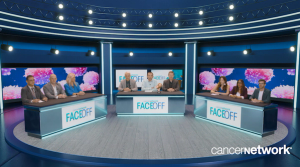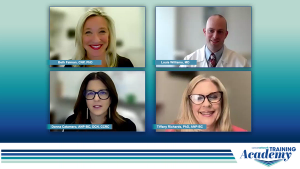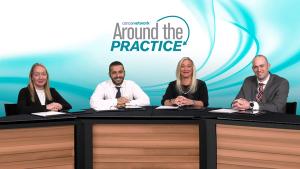Articles by Louis Williams, MD
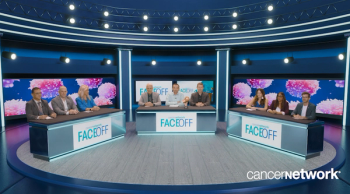
Clinical Scenario: Implementation of Bispecific Therapy for Relapsed Refractory Multiple Myeloma in a Community Center
ByAjai Chari, MD,Thomas G. Martin, MD,Jens Hillengass, MD, PhD ,Beth Faiman PhD, MSN, APN-BC,BMTCN, AOCN, FAAN, FAPO ,Louis Williams, MD,Shebli Atrash, MD ,Donna Catamero, ANP-BC, OCN, CCRC,Cesar Rodriguez Valdes, MD ,Shambavi Richard, MD Panelists discuss how community centers can effectively implement bispecific antibody therapy for patients with relapsed/refractory multiple myeloma, addressing challenges such as staff training, patient monitoring, and managing potential adverse events in a non-academic setting.

Clinical Scenario: A 58-Year Old Woman with Relapsed Refractory Mutiple Myeloma, post-ASCT, MRD-negative, on Bispecific Therapy
ByAjai Chari, MD,Thomas G. Martin, MD,Jens Hillengass, MD, PhD ,Beth Faiman PhD, MSN, APN-BC,BMTCN, AOCN, FAAN, FAPO ,Louis Williams, MD,Shebli Atrash, MD ,Donna Catamero, ANP-BC, OCN, CCRC,Cesar Rodriguez Valdes, MD ,Shambavi Richard, MD Panelists discuss how to approach treatment decisions and management strategies for a 58-year-old woman with relapsed/refractory multiple myeloma who is post-autologous stem cell transplant, MRD-negative, and currently receiving bispecific antibody therapy, considering factors such as prior treatments, response duration, and long-term treatment goals.

Dosing Interval and Considerations for Bispecifics Combination in Relapsed Refractory Multiple Myeloma
ByAjai Chari, MD,Thomas G. Martin, MD,Jens Hillengass, MD, PhD ,Beth Faiman PhD, MSN, APN-BC,BMTCN, AOCN, FAAN, FAPO ,Louis Williams, MD,Shebli Atrash, MD ,Donna Catamero, ANP-BC, OCN, CCRC,Cesar Rodriguez Valdes, MD ,Shambavi Richard, MD Panelists discuss how optimizing dosing intervals and carefully considering combination strategies for bispecific antibodies in relapsed/refractory multiple myeloma could enhance treatment efficacy while managing toxicities and improving patient quality of life.

Sequencing Therapies in Relapsed Refractory Multiple Myeloma: Bispecifics and CAR T-Cell Therapies
ByAjai Chari, MD,Thomas G. Martin, MD,Jens Hillengass, MD, PhD ,Beth Faiman PhD, MSN, APN-BC,BMTCN, AOCN, FAAN, FAPO ,Louis Williams, MD,Shebli Atrash, MD ,Donna Catamero, ANP-BC, OCN, CCRC,Cesar Rodriguez Valdes, MD ,Shambavi Richard, MD Panelists discuss how the optimal sequencing of bispecific antibodies and CAR T-cell therapies in relapsed/refractory multiple myeloma could maximize treatment efficacy and improve patient outcomes in this challenging disease setting.

OPTec: Outpatient Step Up Administration of Teclistamab: Implications in Real-World Practice
ByAjai Chari, MD,Thomas G. Martin, MD,Jens Hillengass, MD, PhD ,Beth Faiman PhD, MSN, APN-BC,BMTCN, AOCN, FAAN, FAPO ,Louis Williams, MD,Shebli Atrash, MD ,Donna Catamero, ANP-BC, OCN, CCRC,Cesar Rodriguez Valdes, MD ,Shambavi Richard, MD Panelists discuss how the OPTec study, which explores outpatient step-up administration of teclistamab, could impact real-world practice by potentially improving patient convenience and reducing healthcare resource utilization in the treatment of multiple myeloma.

Prophylactic Tocilizumab in MajesTEC-1 for the Reduction of CRS
ByAjai Chari, MD,Thomas G. Martin, MD,Jens Hillengass, MD, PhD ,Beth Faiman PhD, MSN, APN-BC,BMTCN, AOCN, FAAN, FAPO ,Louis Williams, MD,Shebli Atrash, MD ,Donna Catamero, ANP-BC, OCN, CCRC,Cesar Rodriguez Valdes, MD ,Shambavi Richard, MD Panelists discuss how prophylactic use of tocilizumab in the MajesTEC-1 trial may reduce the incidence and severity of cytokine release syndrome (CRS) in patients receiving bispecific antibody therapy for multiple myeloma, potentially improving treatment safety and tolerability.

Bispecific Antibody Combinations In Relapsed Refractory Multiple Myeloma: RedirecTT-1 Follow-Up
ByAjai Chari, MD,Thomas G. Martin, MD,Jens Hillengass, MD, PhD ,Beth Faiman PhD, MSN, APN-BC,BMTCN, AOCN, FAAN, FAPO ,Louis Williams, MD,Shebli Atrash, MD ,Donna Catamero, ANP-BC, OCN, CCRC,Cesar Rodriguez Valdes, MD ,Shambavi Richard, MD Panelists discuss how the follow-up results from the RedirecTT-1 study provide insights into the long-term efficacy and safety of bispecific antibody combinations in treating relapsed/refractory multiple myeloma, potentially shaping future treatment approaches for this challenging disease.

Bispecific Antibody Combinations In Relapsed Refractory Multiple Myeloma: TRIMM-2 Study
ByAjai Chari, MD,Thomas G. Martin, MD,Jens Hillengass, MD, PhD ,Beth Faiman PhD, MSN, APN-BC,BMTCN, AOCN, FAAN, FAPO ,Louis Williams, MD,Shebli Atrash, MD ,Donna Catamero, ANP-BC, OCN, CCRC,Cesar Rodriguez Valdes, MD ,Shambavi Richard, MD Panelists discuss how the TRIMM-2 study explores the potential of combining bispecific antibodies to enhance treatment efficacy in patients with relapsed/refractory multiple myeloma, potentially offering a novel therapeutic strategy for this difficult-to-treat condition.

Talquetamab, a GPRC5DxCD3 bispecific antibody (BsAb), for Relapsed Refractory Multiple Myeloma: MonumenTAL-1 Data and Implications
ByAjai Chari, MD,Thomas G. Martin, MD,Jens Hillengass, MD, PhD ,Beth Faiman PhD, MSN, APN-BC,BMTCN, AOCN, FAAN, FAPO ,Louis Williams, MD,Shebli Atrash, MD ,Donna Catamero, ANP-BC, OCN, CCRC,Cesar Rodriguez Valdes, MD ,Shambavi Richard, MD Panelists discuss how Talquetamab, a novel GPRC5DxCD3 bispecific antibody, shows promising results in treating relapsed/refractory multiple myeloma based on the MonumenTAL-1 trial data, potentially offering a new therapeutic option for this challenging patient population.
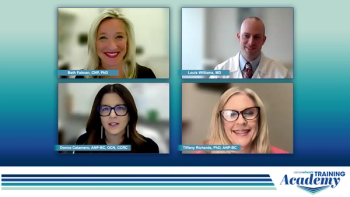
Unmet Needs and Future Perspectives for CAR T-Cell Therapy in R/R MM
ByBeth Faiman, PhD, CNP,Louis Williams, MD,Donna Catamero, ANP-BC, OCN, CCRC,Tiffany Richards, PhD, ANP-BC The panel concludes by offering key takeaways on the treatment of patients with relapsed/refractory multiple myeloma who receive CAR T-cell therapy.

Managing Cytopenias and HLH/MAS Following CAR T-Cell Therapy
ByBeth Faiman, PhD, CNP,Louis Williams, MD,Donna Catamero, ANP-BC, OCN, CCRC,Tiffany Richards, PhD, ANP-BC Continuing the discussion on supportive care strategies, the panel discusses the management of cytopenias and HLH/MAS following CAR T-cell therapy.

Supportive Care Strategies for CAR T-Cell Therapy Recipients
ByBeth Faiman, PhD, CNP,Louis Williams, MD,Donna Catamero, ANP-BC, OCN, CCRC,Tiffany Richards, PhD, ANP-BC Experts on multiple myeloma provide clinical insights on supportive care strategies for patients experiencing infections or secondary malignancies following CAR T-cell therapy.

The Importance of Multidisciplinary Collaboration in CRS Management
ByBeth Faiman, PhD, CNP,Louis Williams, MD,Donna Catamero, ANP-BC, OCN, CCRC,Tiffany Richards, PhD, ANP-BC Focusing on supportive care practices, the panel discusses the critical role of effective multidisciplinary team collaboration and communication in optimizing the management of CRS and ICANS in patients receiving CAR T-cell therapy.

Clinical Practices for Treating ICANS Following CAR T-Cell Therapy
ByBeth Faiman, PhD, CNP,Louis Williams, MD,Donna Catamero, ANP-BC, OCN, CCRC,Tiffany Richards, PhD, ANP-BC The panel provides comprehensive insights on the treatment of ICANS following CAR T-cell therapy, highlighting the role of imaging, clinical trial data, and clinical pearls for community practices.

Patient Profile 2: Managing ICANS Following CAR T-Cell Therapy
ByBeth Faiman, PhD, CNP,Louis Williams, MD,Donna Catamero, ANP-BC, OCN, CCRC,Tiffany Richards, PhD, ANP-BC Donna Catamero, ANP-BC, OCN, CCRC, presents the case of a 77-year-old patient who experienced ICANS following CAR T-cell therapy and describes the role of the ICE score.

Strategies to Manage or Mitigate CRS
ByBeth Faiman, PhD, CNP,Louis Williams, MD,Donna Catamero, ANP-BC, OCN, CCRC,Tiffany Richards, PhD, ANP-BC Experts on multiple myeloma provide clinical insights on strategies to manage or mitigate CRS, highlighting premedications, the role of bridging therapy, and potential treatment strategies.

Underlying Mechanisms and Signs of CRS
ByBeth Faiman, PhD, CNP,Louis Williams, MD,Donna Catamero, ANP-BC, OCN, CCRC,Tiffany Richards, PhD, ANP-BC The panel discusses the mechanisms believed to cause cytokine release syndrome associated with CAR T-cell therapy and the signs and symptoms.

Patient Profile 1: Managing CRS Following CAR T-Cell Therapy
ByBeth Faiman, PhD, CNP,Louis Williams, MD,Donna Catamero, ANP-BC, OCN, CCRC,Tiffany Richards, PhD, ANP-BC Beth Faiman, CNP, PhD, presents the case of a 76-year-old woman with multiple myeloma who experienced cytokine release syndrome (CRS) following CAR T-cell therapy.

Navigating CAR T-Cell Therapy in Multiple Myeloma: A Collaborative, Patient-Centered Approach
ByBeth Faiman, PhD, CNP,Louis Williams, MD,Donna Catamero, ANP-BC, OCN, CCRC,Tiffany Richards, PhD, ANP-BC Experts on multiple myeloma discuss how they educate and prepare patients who are going to receive CAR T-cell therapy and provide clinical insights on transitioning patients to community practices following treatment.

Unique Challenges in Managing Adverse Events Associated with CAR T-Cell Therapy
ByBeth Faiman, PhD, CNP,Louis Williams, MD,Donna Catamero, ANP-BC, OCN, CCRC,Tiffany Richards, PhD, ANP-BC A panel of experts on multiple myeloma give an overview of unique challenges in managing adverse effects associated with CAR T-cell therapy as compared with other cancer therapies.
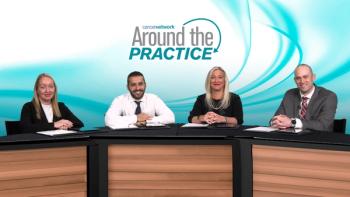
Before closing out their discussion on multiple myeloma management, panelists reflect on real-world clinical practice perspectives on treatment with bispecifics.

A review of novel treatment modalities for relapsed/refractory multiple myeloma, with a focus on selecting and sequencing bispecific antibodies and CAR T-cell therapies.

Expert panelists center discussion on a final patient case to review the identification and management of relapsed/refractory multiple myeloma.

Expert perspectives on selection of induction therapy for patients with transplant-ineligible newly diagnosed multiple myeloma.

Panelists move on to review a patient case of transplant-ineligible newly diagnosed multiple myeloma and highlight clinical workup strategies.

A focused discussion on navigating the treatment armamentarium for patients with transplant-eligible newly diagnosed multiple myeloma.

Centering discussion on a patient case of transplant-eligible newly diagnosed multiple myeloma, expert panelists consider optimal workup and management strategies.






